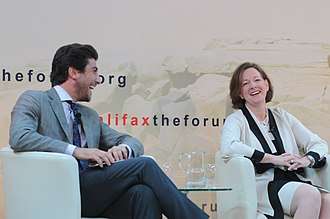Fabrice Pothier

Fabrice Pothier (born 24 August 1975) is a French political expert and a Chief Strategy Officer at political consultancy, Rasmussen Global.[1] He is a former NATO director of policy planning and founding director of Carnegie Europe, an organisation which became one of Europe's leading think-tanks on foreign policy and strategic issues.
Afghanistan
In the early 2000s, Pothier co-founded the Senlis Council, later renamed the International Council on Security and Development), a project founded by the Network of European Foundations and led a global advocacy campaign calling for a more progressive more progressive drugs policy. [2] He established a partnership with the International Federation of the Red Cross and Red Crescent and worked in Afghanistan advocating against the ‘war on drugs’ and working with the Afghan Red Crescent in developing better health facilities for drug addicts.[3] He is credited to having been the first to publish a report on the insurgency in the province of Helmand. [4]
NATO
Within NATO, Pothier is credited to have been behind some of the Alliance’s most consequential initiatives launched at the 2014 NATO Summit including the Readiness Action Plan, the Defence Capacity Building Initiative and Smart Defence at the Chicago Summit in May 2012. He advised the NATO Secretary General on a wide range of strategic issues and on his communication strategy, including by drafting landmark speeches and articles for the Munich Security Conference and Foreign Affairs.[5]
Rasmussen Global
Since 2015, Pothier has been a senior director at Rasmussen Global. He regularly features in the Financial Times, the Wall Street Journal, Politico Europe, Survival, Washington Post and Euronews. [6] He has been a contributor to BBC World, France24, Al-Jazeera, CNBC Bl,oomberg, and has testified before the UK Parliament’s Foreign Affairs Committee. [7] He writes on strategic affairs for London-based International Institute of Strategic Studies. [8] [9]
References
- ↑ Rasmussen Global - the Firm
- ↑ Two charts that prove the Afghan drug war is a total failure
- ↑ "Humanitarian" morphine will come from Afghanistan
- ↑ The Changing Nature of the Insurgency in Southern Afghanistan and its Effects on the Future of the Country
- ↑ NATO Bio
- ↑ Damon Embling. Syria: How far could things escalate?
- ↑ Carnegie Europe Fabrice Pothier
- ↑ Pothier. Macron L'Americain
- ↑ Moret and Pothier. Sanctions After Brexit